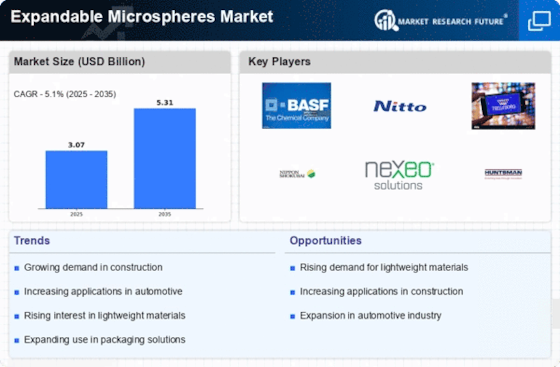Top Industry Leaders in the Expandable Microspheres Market
 This expandable microspheres market technology, comprising thermoplastic shells encapsulating low-boiling-point liquid hydrocarbons, boasts a 60-80 times expansion potential, creating a world of possibilities across diverse industries. To navigate this dynamic landscape, understanding the competitive strategies, market share factors, and recent developments is crucial.
This expandable microspheres market technology, comprising thermoplastic shells encapsulating low-boiling-point liquid hydrocarbons, boasts a 60-80 times expansion potential, creating a world of possibilities across diverse industries. To navigate this dynamic landscape, understanding the competitive strategies, market share factors, and recent developments is crucial.
Market Leaders and Strategies:
-
Nouryon (Netherlands): The undisputed leader, Nouryon holds a significant market share through its Expancel® brand, known for its quality and diverse applications. Their strategy hinges on continuous innovation, expanding production capacity, and forging strategic partnerships in emerging markets. -
Matsumoto Yushi-Seiyaku (Japan): This Japanese giant holds a strong share thanks to its focus on niche applications like thermal insulation and lightweight composites. Their recent acquisition of a Chinese microsphere producer further bolsters their Asian presence. -
Kureha (Japan): Another Japanese powerhouse, Kureha leverages its expertise in polymer chemistry to develop custom microsphere solutions for specific industries like automotive and electronics. Their emphasis on sustainability through bio-based expandables attracts eco-conscious customers. -
Sekisui Chemical (Japan): A diversified chemicals company, Sekisui Chemical targets the construction and packaging sectors with its microsphere offerings. Their focus on cost-effectiveness and regional production facilities enables them to cater to price-sensitive markets. -
Kumyang (South Korea): Rising rapidly, Kumyang is driven by its competitive pricing and investments in R&D for novel applications. Their entry into the medical and healthcare segment expands their reach and potential.
Factors Shaping Market Share:
-
Product Innovation: Companies that develop next-generation microspheres with improved characteristics like higher expansion ratios, fire retardancy, and biodegradability gain an edge. -
Regional Focus: Expanding production and distribution networks in high-growth regions like Asia and Latin America opens doors to new market segments. -
Sustainability: The rising demand for eco-friendly solutions pushes companies to adopt bio-based materials and implement sustainable production practices. -
Vertical Integration: Integrating upstream and downstream operations into the supply chain enhances cost control and responsiveness to customer needs. -
Strategic Partnerships: Collaborations with industry players, research institutions, and distributors accelerate market penetration and technological advancements.
Key Companies in the Expandable Microspheres market include
- Nanjing Chemical Material Corp. (China)
- Mark Impex (India)
- Matsumoto Yushi-Seiyaku Co., Ltd (Japan)
- Nouryon (Netherlands)
- KUREHA CORPORATION (Japan)
- Dennert Poraver GmbH (Germany)
- Chase Corporation (US), Nanosphere (China)
- SEKISUI CHEMICAL CO., LTD. (Japan)
- Shanghai Joysun Chemical Co., Ltd (China)
Recent Developments:
-
June 2023: Matsumoto Yushi-Seiyaku expands its microsphere production capacity in China, aiming to tap into the booming Asian construction market. -
August 2023: Kureha unveils a microsphere-based thermal insulation film for buildings, offering improved energy efficiency and sustainability. -
October 2023: Sekisui Chemical enters a collaborative research project with a university to develop microspheres for next-generation electronics packaging. -
November 2023: Kumyang establishes a new research and development center in Europe, focusing on microsphere applications for the automotive industry. -
December 2023: Nouryon partners with a recycling company to develop a closed-loop system for expandable microspheres, aiming to reduce plastic waste.










